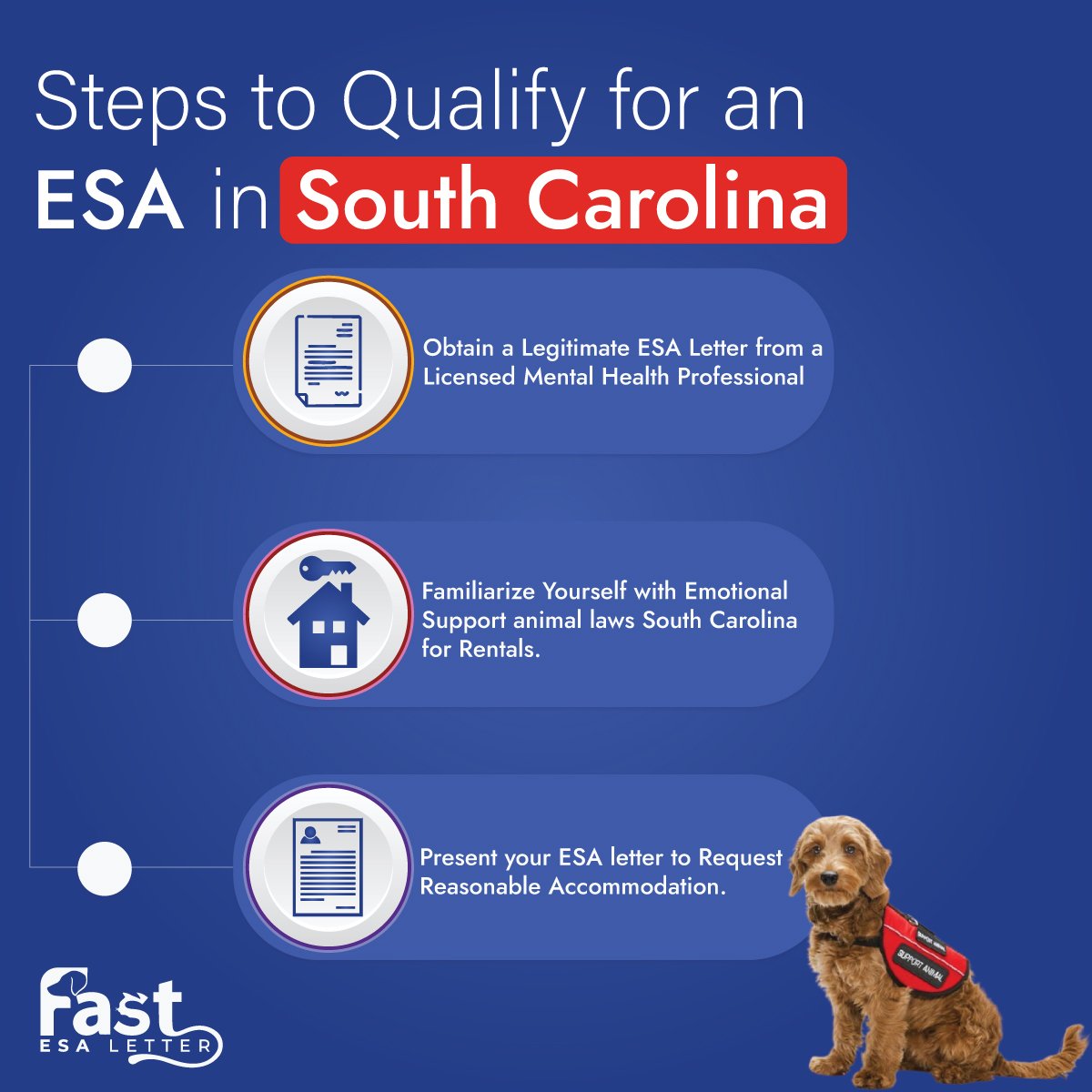What Are the Emotional Support Animal (ESA) Laws in South Carolina?

Robert Clendenin, MD
For many, life with an emotional support animal means a much-needed sense of relief from stress, anxiety, or other challenges that can make daily life overwhelming. These loyal companions are a vital part of emotional healing and stability. But what happens when landlords impose restrictions, workplaces hesitate to accommodate, or public spaces create barriers for your ESA? These situations can feel frustrating and isolating, especially when you’re uncertain about your rights.
If you’re a South Carolina resident relying on an ESA, understanding South Carolina ESA laws is essential to safeguard your peace of mind. From housing protections to workplace accommodations and public access considerations, knowing the rules empowers you to advocate for yourself and your trusted companion. Let’s dive into these laws and ensure you have the necessary clarity.

South Carolina ESA Laws for Housing
South Carolina’s housing regulations for emotional support animals primarily follow the guidelines of the Fair Housing Act (FHA). Here’s what you need to know about your housing rights:
- Even properties with strict no-pet policies must permit ESAs when a valid ESA letter is provided. This applies to rental properties, condos, co-ops, and more.
- Unlike traditional pets, landlords cannot impose additional pet fees or deposits for ESAs. However, tenants are responsible for damages caused by their ESA.
- Landlords can request proof in the form of a legitimate ESA letter. This document should confirm the ESA’s necessity for your emotional or mental well-being.
- Landlords can refuse accommodations only under specific circumstances—such as when an ESA poses a direct threat to others’ safety or causes significant damage to property.
South Carolina ESA Laws for Travel
Air Travel
In the past, emotional support animals had protections under the Air Carrier Access Act (ACAA). However, as of January 2021, airlines are no longer required to treat ESAs as service animals. Instead, most airlines now classify ESAs as pets, subjecting them to pet fees, size restrictions, and travel in specific areas, such as under the seat.
If you’re planning to fly with your ESA:
- Check the airline’s pet policy in advance.
- Have an updated ESA letter handy, as some airlines may request it.
- Ensure your ESA is well-behaved and able to remain calm during travel.
Train Travel
Bus Travel
Taxis, Rideshares, and Car Rentals
South Carolina ESA Public Access Laws
ESA-Friendly Spots in South Carolina

- James Island County Park (Charleston): An expansive park with dedicated dog-friendly areas.
- Saluda Shoals Park (Columbia): A family-friendly location with nature trails and pet amenities.
- The Barking Lot (Greenville): A popular café for pet enthusiasts.
- Barefoot Landing (North Myrtle Beach): A pet-friendly shopping and dining hub.
- Freedom Park (Charlotte, near SC border): A serene spot that welcomes furry companions.
South Carolina ESA Laws for Employment
Workplaces in South Carolina are not legally required to accommodate emotional support animals. However, South Carolina laws on emotional support animals allow for employer discretion. You can request accommodation by presenting an ESA letter in South Carolina and explaining how the animal helps with your disability. Be prepared for employers to ask for an ESA letter and consider alternative solutions if accommodating the ESA is not possible.
Steps to Qualify for an ESA in South Carolina
- Obtain a legitimate ESA letter from a licensed mental health professional.
- Familiarize yourself with emotional support animal laws South Carolina for rentals.
- Present your ESA letter to request reasonable accommodation.

Conclusion
Frequently Asked Questions
What Are Emotional Support Animal Rental Laws In South Carolina?
Where Are Emotional Support Animals Allowed In South Carolina?
Can A Workplace Deny My Request To Bring An ESA?
Are There Penalties For Misrepresenting A Pet As An ESA In South Carolina?
Post Author
Prince Sharma
Related Articles
What Are the Emotional Support Animal Laws in Kansas?
What Are the Emotional Support Animal Laws in Kansas?In Kansas, emotional support animals (ESAs) are protected under federal laws like the Fair Housing Act, which allows them in housing without pet fees, even in no-pet policies. However, ESAs are not...
What Are the Emotional Support Animal Laws in Nebraska?
What Are the Emotional Support Animal Laws in Nebraska?In Nebraska, emotional support animals (ESAs) are protected under federal laws like the Fair Housing Act, which allows them in housing without pet fees, even in no-pet policies. However, ESAs are...
What Are the Emotional Support Animal Laws in Wyoming?
What Are the Emotional Support Animal Laws in Wyoming?In Wyoming, emotional support animals (ESAs) are protected under federal laws like the Fair Housing Act, which allows them in housing without pet fees, even in no-pet policies. However, ESAs are...
Live Free with Your ESA!
An ESA Letter Unlocks Freedom!





